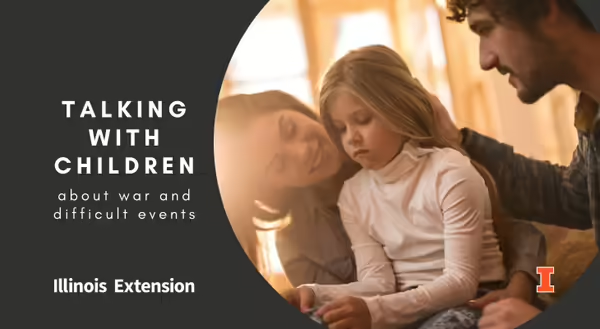
The day after Russia attacked Ukraine, when I picked my 10-year-old daughter up from school, she asked, “Is it over?” I wasn’t sure what she was talking about, so I asked her what she meant. She said, “the war with Russia and Ukraine-is it over yet?” Knowing that we hadn’t talked about it at home yet, I knew I needed to find out what she knew and how she was feeling.
Ask what your child knows
Experts suggest that asking your children what they know in situations like this is a good first step. From that point, a parents’ next steps depend largely on the age and developmental understanding of the child, says Harvard Professor of Education, Kathleen McCartney.
Be on the lookout for anxiety
Be on the lookout for indicators of anxiety in your children, regardless of age. Jerome Kagan, Research Professor of Psychology at Harvard, shares four signs: sleep disturbances, loss of appetite, spontaneous crying and “clinginess” or difficulty leaving mom or dad. However, even if you don’t notice these signs, it is a good idea to check in with your child and find out what they know and help them understand what they have heard.
Provide simple, truthful information
For young children who may have a limited understanding of war and conflict, provide them with simple and truthful information if they ask. Be concise and try not to share more than what they asked to know. You can often tell by how they react if they are still wanting more information.
Discuss where older children get their information
As children get older, it is important to ask where they got their information and how they feel about what they know. Middle school and high schoolers often get their information from friends and social media. This probably means they have an idea of what is happening but may not understand why or may not have completely accurate information. Discussing what they know and how to find truthful information is important. Talk with your teen/tween about sources and how to determine if information is accurate. Research information together if they are curious and let them know you are always there to answer questions. In addition, be aware of their level of stress or anxiety and be mindful of the amount of time they are spending watching information about the topic.
For more information on talking with your children about war and other tough topics, check out these resources:
What to tell children about War, The Harvard Gazette
How to talk about difficult subjects, Common Sense Media
MEET THE AUTHOR
Judy Schmidt provides leadership to 4-H metro programming in Peoria County. Schmidt joined Extension in 2001, working as a Youth Development Educator at the East Peoria Center and joined the Fulton-Mason-Peoria-Tazewell unit in 2011. Her work focuses on 4-H youth development programming in the local metropolitan area, specifically leading positive youth development initiatives for after-school programs, community groups, 4-H clubs and other youth-serving organizations. Her areas of expertise include positive youth development principles, youth leadership, and work with teens as teachers.
Schmidt attended the University of Illinois at Urbana-Champaign for her bachelor's degree in psychology and also for her master's degrees in Social Work and Marriage and Family Therapy. She is a certified facilitator of the Matrixx System/Real Colors program by the National Curriculum and Training Institute.
ABOUT THE BLOG
Connection Corner: is a blog that provides timely information, activities, and resources to help you stay connected to loved ones, the world around you, and yourself.